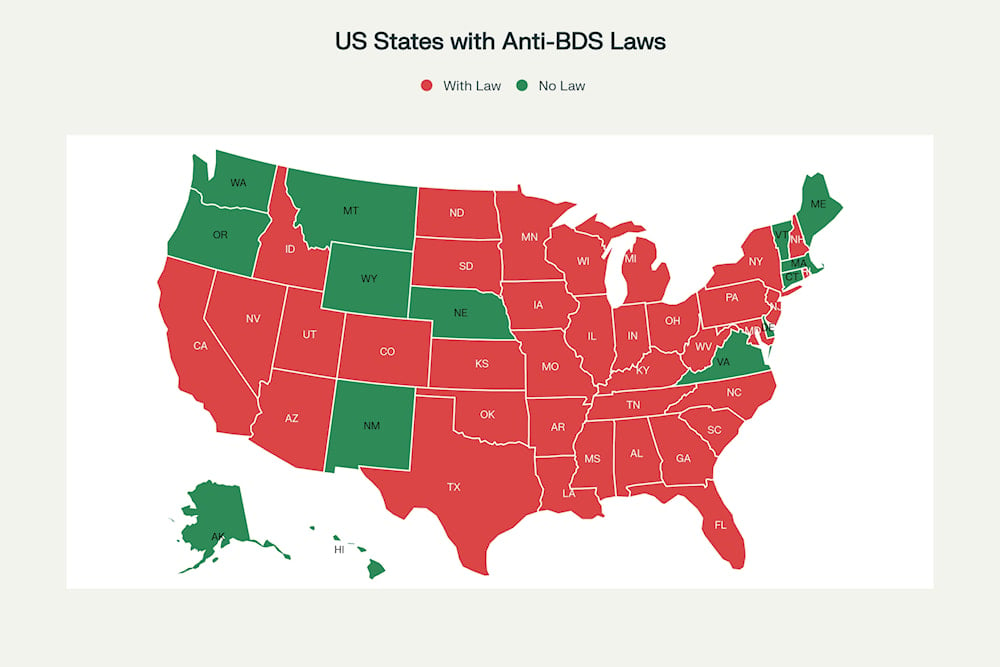Trump administration's anti-boycott stance triggers MAGA backlash
A brief FEMA policy tying federal aid to anti-boycott pledges on "Israel" ignites MAGA backlash, resurfacing legal debates over free speech and state laws.
-

Hats are seen on the desk as President Donald Trump speaks with reporters after signing executive orders in the Oval Office of the White House, Wednesday, April 23, 2025, in Washington. (AP Photo/Alex Brandon)
The Trump administration faced sharp criticism from its MAGA base after a brief policy by the Federal Emergency Management Agency (FEMA) appeared to condition federal funding on states refraining from boycotting "Israel".
The condition, first reported by Reuters, stated that grant recipients must not limit "commercial relations specifically with Israeli companies or with companies doing business in or with Israel or authorized by, licensed by, or organized under the laws of Israel."
This requirement was initially included in documents related to at least $1.9 billion in grants used for essential emergency management resources, including rescue gear and power systems.
However, following media inquiries by Newsweek and Reuters, the Department of Homeland Security (DHS), which oversees FEMA, stated that no such requirement exists in any current Notice of Funding Opportunity (NOFO). The updated grant document removed the controversial language.
MAGA figures criticize Trump
The temporary inclusion of the condition sparked immediate backlash from many prominent MAGA figures who have previously criticized Trump's unconditional support for "Israel", particularly amid the US-backed Israeli genocide in Gaza.
"Denying Americans who won't support the genocide being conducted by your friends," conservative commentator Candace Owens posted on X. "Trump has fully betrayed America for [Israeli Prime Minister Benjamin] Netanyahu."
Denying Americans who won’t support the genocide being conducted by your friends.
— Candace Owens (@RealCandaceO) August 4, 2025
Trump has fully betrayed America for Netanyahu and if you cannot see that now you are completely blind.
Best 100 million Miriam Adelson ever spent. https://t.co/l7SWjLtNvP
Far-right activist Milo Yiannopoulos questioned the decision, while the Hodgetwins asked, "Is this America first?" in reference to the policy.
Is this America first? https://t.co/8iNWDAKuzA
— Hodgetwins (@hodgetwins) August 4, 2025
DHS clarifies FEMA policy after backlash
Following the uproar, DHS clarified that no states have lost funding and no new conditions have been imposed. A DHS spokesperson emphasized, "FEMA grants remain governed by existing law and policy and not political litmus tests."
The department reaffirmed its commitment to anti-discrimination laws, including opposition to the Boycott, Divestment, and Sanctions (BDS) movement, which it labeled antisemitic.
There is NO FEMA requirement tied to Israel in any current NOFO. No states have lost funding, and no new conditions have been imposed.
— Homeland Security (@DHSgov) August 4, 2025
FEMA grants remain governed by existing law and policy and not political litmus tests. DHS will enforce all anti-discrimination laws and… https://t.co/AeJeaeTlRS
Debate over BDS movement
The FEMA controversy is the latest episode in the broader political debate over the BDS movement and US support for "Israel". In May, figures from the MAGA movement criticized the bipartisan IGO Anti-Boycott Act, arguing it would criminalize free speech.
Republican Representative Marjorie Taylor Greene opposed the bill, stating, "It is my job to defend Americans' rights to buy or boycott whomever they choose without the government harshly fining them or imprisoning them." Greene has also labeled "Israel's" actions in Gaza as a "genocide," becoming the first Republican in Congress to do so.
The Trump administration's brief FEMA policy exposed a deepening rift within the Republican Party. While many establishment and hawkish Republicans support close ties with "Israel," an increasingly vocal faction of the MAGA base advocates for a non‑interventionist, America First foreign policy.
Anti‑boycott laws: Who has them?

As of mid‑2025, 38 US states have enacted anti‑BDS legislation or executive orders requiring contractors, suppliers, or pension participants to certify they do not boycott "Israel" or Israeli-affiliated entities. These include states like Florida, Texas, Kansas, Arizona, Georgia, Wisconsin, Maryland, Kentucky, and New York.
Alternatively, roughly a dozen states have no such laws in effect. Several, including Illinois, Minnesota, and Wisconsin, have begun repeal efforts. Others, such as Connecticut, are considering new anti‑BDS legislation.

 3 Min Read
3 Min Read









